#leanne betasamosake simpson
Text
Queer books?? fuck yeah. Indigenous Queer books for Indigenous Heritage Month??!? even better.
#in case you didn’t know#we exist out on instagram as well#check out our recs from some incredible indigenous authors from across turtle island!#all available to check out or put a hold on from QLL#<3#indigenous heritage month#this town sleeps#dennis e staples#noopiming#leanne betasamosake simpson#green fuse burning#tiffany morris#a broken blade#melissa blair#kiss of the fur queen#tomson highway#magodiz#gabe calderon#ask the brindled#no'u revilla#awasis#louise b halfe#blood#tyler pennock#postcolonial love poem#natalie diaz#disintegrate dissociate#arielle twist#feed#tommy pico
290 notes
·
View notes
Text
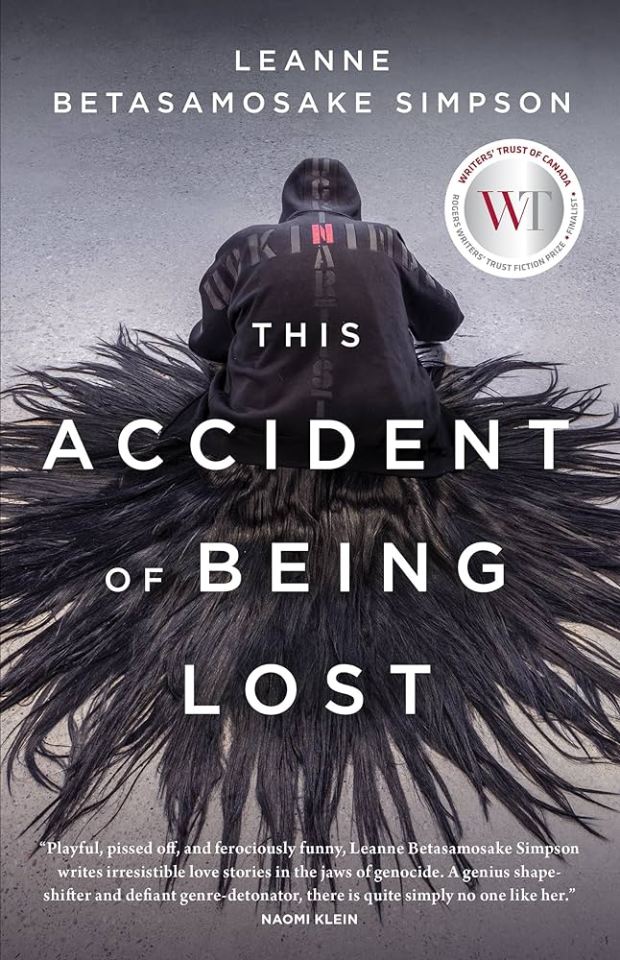
#short story collections#short story collection#the accident of being lost: songs and stories#leanne betasamosake simpson#21st century literature#canadian literature#indigenous literature#mississauga literature#english language literature#have you read this short fiction?#book polls#completed polls
24 notes
·
View notes
Text
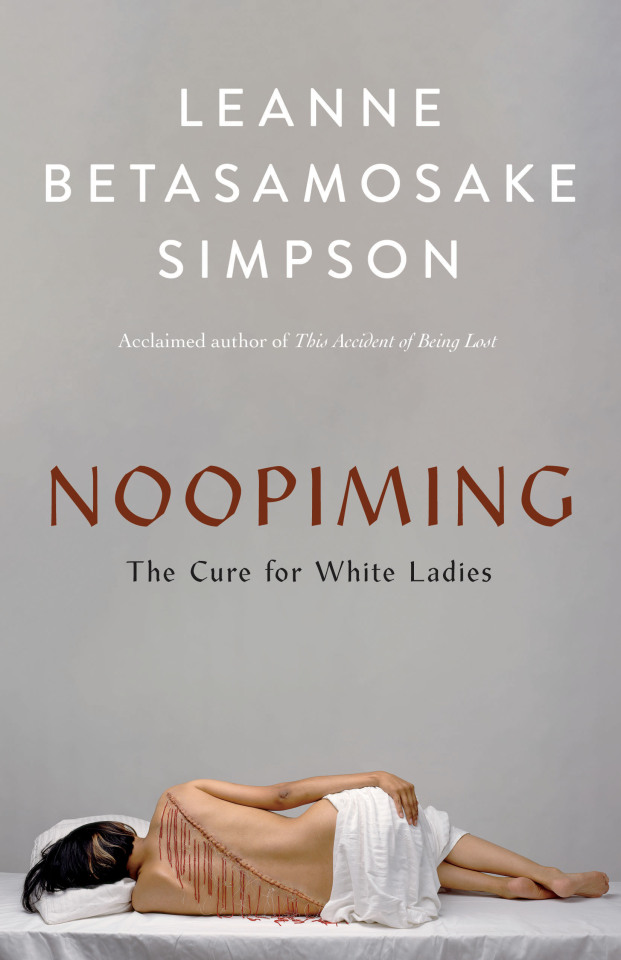
vote yes if you have finished the entire book.
vote no if you have not finished the entire book.
(faq · submit a book)
5 notes
·
View notes
Text
youtube
#art#leanne betasamosake simpson#under your always light#art student#art school#artist#indigenous artists#anishinaabe artists#Youtube
4 notes
·
View notes
Quote
If you go out into a part of the bush you haven’t been before with an Elder, the Elder will often get you to stop on the trail and look back. This is done so that if you get lost or separated, you’ll know the way back home. By “looking back” the hope is that one learns to recognize features of the specific and intricate features of the landscape. The path looks completely different on the way home because there is a different set of visual cues. “Looking back” is something that is done to keep us safe and independent and literally connected to the landscape.
Our Ancestors were very astute at reading landscapes. So let’s recognize the value of this technique and apply this technique to the Canadian political landscape. Let’s stop and take a look around and focus on those visual cues, not what settler governments are saying, but the evidence of what they’ve done.
Leanne Betasamosake Simpson in Decolonization: Indigeneity, Education & Society (2012). Aambe! Maajaadaa! (What #IdleNoMore Means to Me)
13 notes
·
View notes
Text
I pity the country,
I pity the state
And the mind of a man
Who thrives on hate
Small are the lives
Of cheats and of liars
Of Bigoted newspress
Fascist town criers
Deception annoys me
Deception destroys me
The Bill of rights throws me
Jails they all know me
Frustrated are churchmen
The saving-of-soul men
The Tinker the tailor
The Colonial governor
They rape and they beat me
They're seeking to draw me
Away from the roundness
Of this life
Silly Civil Servants
They thrive off my body
Their trip is with power
Back bacon and welfare
Police they arrest me
Materialists detest me
Pollution it chokes me
Movies they joke me
Politicians exploit me
City life it jades me
Hudson's Bay fleeces me
Hunting laws freak me
Government is bumbling
Revolution is rumbling
To be ruled in impunity
Is tradition continuity
I pity the country
I pity the state
And the mind of a man
Who thrives on hate
I pity this country
#i pity the country#leanne betasamosake simpson#willie dunn#lyrics#music#free palestine#free congo#free sudan#free yemen#free gaza#Spotify
3 notes
·
View notes
Text
#france daigle#christina sharpe#terry tempest williams#alicia garza#sakine cansız#mariame kaba#susan sontag#lisa wells#lorraine o’grady#paul valéry#alexis pauline gumbs#carolyn forché#ann snitow#nicholas ridout#leanne betasamosake simpson#mckenzie wark#lynne tillman#fernando pessoa#quotes#quotations
3 notes
·
View notes
Text
corps contusionnés
peau sèche
côtes brisées
rage déshydratée
— on se perd toujours par accident, leanne betasamosake simpson
#citations#leanne betasamosake simpson#littérature canadienne#littérature#rpg ressources#rpg francophone
0 notes
Text
10.11.2022
The term papers and assigments have finally landed and it seems like it’s all I do. Though it’s just 5h of actual, intense studying daily, it still is more than Ive done so far in here. Still, it´s quite possible that with this pace I will get everything done 2 weeks in advance but I think that´s part of the plan, so I can just chill and enjoy the winter here.
The polar night is what I´ve awaited the most even though I have experienced it before. The northern lights were on top of my list but it seems that on most nights it´s too cloudy here so you can´t see them. I think that is fine since I can still have the fjells and the actual 6 weeks of darkness. Tho I know from experience that it´s not going to be completely dark, a kind of sunset that lasts for 3 hours and then it slowly sets to dark skies again.
The assigments that I am working on at the moment are:
3 page essay about a “keyword” (probably Land) in 2 native american novels (I´m going with “There There” by Tommy Orange and “The Grass Dancer” by Susan Power).
8 page essay of a deeper analysis on either of the books I´ve mentioned above
10-15 page essay analysis about Faulkner´s “As I lay dying”, I´ll pair southern gothic with the “downfall of the slavery system”
10-15 page essay about “Bewilderment” (by Richard Powers), with a gender studies and ecocritical lens
past assigments (things I´ve finished in the past 3 days):
A presentation of the violence against native american women
Backround statistics hunting for the said presentation
Two smaller 2 -page essays (for Native lit + theory of lit courses)
4 very small, 400 -page “blog posts” for the Native Lit course
Read both Faulkner´s “Absalom Absalom!” and “The Only Good Indians” by Stephen Graham Jones
Started reading Faulkner´s “Go down Moses”
... Looking at the list makes me understand why I feel ~a bit~ stressed and why my undereyes hurt. Should sleep more but we had two nights of clear skies so obviously I had to stay up all night sky watching. It was a nice full moon too. I have been too busy to actually practice my norwegian but I will get back to it after I get some of this work amount done.
There´s snow on the mountains but not in here anymore, it was a couple of degrees on the plus C side and it melted from the lowlands area. Waiting that maybe it could snow more on the following 4 days that´s supposed to be rainy anyways and it would be bright and lovely.
#student exchange#uni work#arktiske universitet i tromsø#uni life#Literature Student#study diary#studyblr#william faulkner#leanne betasamosake simpson#indigenous literature#native american literature#feminist studies
0 notes
Text
In her debut collection of short stories, Islands of Decolonial Love, renowned writer and activist Leanne Simpson vividly explores the lives of contemporary Indigenous Peoples and communities, especially those of her own Nishnaabeg nation.
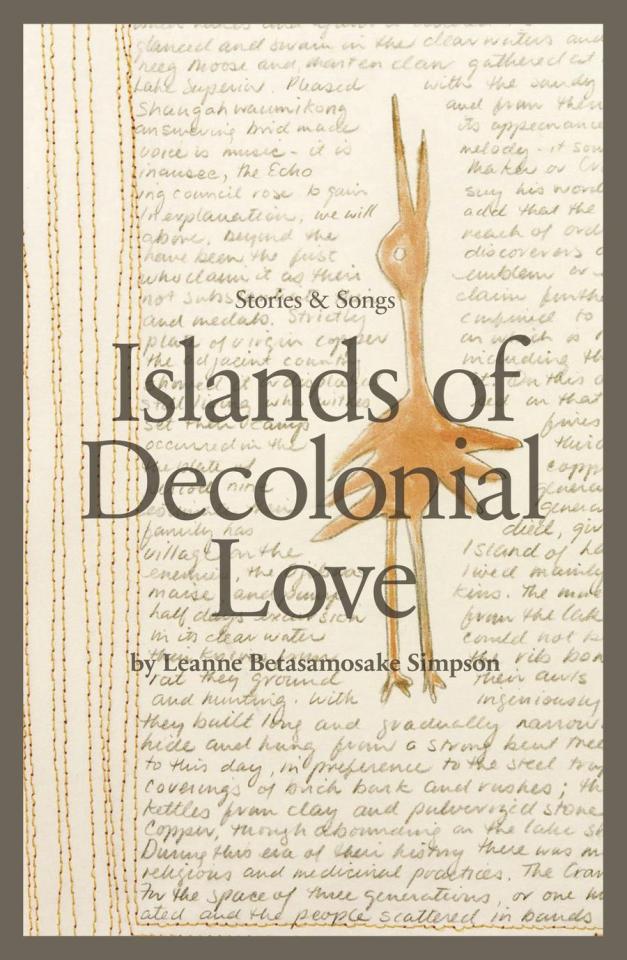
#polls#book: islands of decolonial love#author: leanne betasamosake simpson#genre: poetry#year: 2010s
12 notes
·
View notes
Text
state of the world + capitalism + ppls resentment of one another and thus their inability to even try to form communities is really getting me down on this wednesday morning
#personal#delete#keep reading these essays abt isolation and the 'desire to escape' from all of humanity and im like read some fucking#leanne betasamosake simpson and you will heal and change ur damn mind u freaks#i dont want 2 isolate myself Alone in a silly little privileged bubble i for one love meeting people and talking to people and hearing abt#the interesting things that ppl who r different from me have gotten up to or accomplished what the fuck#'everyone deep down has the desire to retreat' No I Don't? Do U know how Boring the world in the absence of humanity ? What ?#do u truly think so highly of urself that u think ur the only person in this world worth spending time with? DAMN
5 notes
·
View notes
Text
‘Extraction and assimilation go together. Colonialism and capitalism are based on extracting and assimilating. My land is seen as a resource. My relatives in the plant and animal worlds are seen as resources. My culture and knowledge is a resource. My body is a resource and my children are a resource because they are the potential to grow, maintain, and uphold the extraction-assimilation system. The act of extraction removes all of the relationships that give whatever is being extracted meaning. Extracting is taking. Actually, extracting is stealing—it is taking without consent, without thought, care or even knowledge of the impacts that extraction has on the other living things in that environment. That’s always been a part of colonialism and conquest. Colonialism has always extracted the indigenous—extraction of indigenous knowledge, indigenous women, indigenous peoples . . . Children from parents. Children from families. Children from the land. Children from our political system and our system of governance. Children—our most precious gift. In this kind of thinking, every part of our culture that is seemingly useful to the extractivist mindset gets extracted. The canoe, the kayak, any technology that we had that was useful was extracted and assimilated into the culture of the settlers without regard for the people and the knowledge that created it.’
- Leanne Betasamosake Simpson
In conversation with Naomi Klein
405 notes
·
View notes
Text
Leanne: Extraction and assimilation go together.
Colonialism and capitalism are based on extracting and assimilating. My land is seen as a resource. My relatives in the plant and animal worlds are seen as resources. My culture and knowledge is a resource. My body is a resource and my children are a resource because they are the potential to grow, maintain, and uphold the extraction-assimilation system. The act of extraction removes all of the relationships that give whatever is being extracted meaning.
Extracting is taking. Actually, extracting is stealing -- it is taking without consent, without thought, care or even knowledge of the impacts that extraction has on the other living things in that environment. That’s always been a part of colonialism and conquest. Colonialism has always extracted the indigenous -- extraction of indigenous knowledge, indigenous women, indigenous peoples. [...]
Children from parents. Children from families. Children from the land. Children from our political system and our system of governance. [...] In this kind of thinking, every part of our culture that is seemingly useful to the extractivist mindset gets extracted. The canoe, the kayak, any technology that we had that was useful was extracted and assimilated into the culture of the settlers without regard for the people and the knowledge that created it.
When there was a push to bring traditional knowledge into environmental thinking after Our Common Future, [a report issued by the United Nations World Commission on Environment and Development] in the late 1980s, it was a very extractivist approach: “Let’s take whatever teachings you might have that would help us right out of your context, right away from your knowledge holders, right out of your language, and integrate them into this assimilatory mindset.” It’s the idea that traditional knowledge and indigenous peoples have some sort of secret of how to live on the land in an non-exploitive way that broader society needs to appropriate. But the extractivist mindset isn’t about having a conversation and having a dialogue and bringing in indigenous knowledge on the terms of indigenous peoples. It is very much about extracting whatever ideas scientists or environmentalists thought were good and assimilating it.
Naomi [interviewer]: Like I’ll just take the idea of “the seventh generation” and…
Leanne: …put it onto toilet paper and sell it to people. There’s an intellectual extraction, a cognitive extraction, as well as a physical one. The machine around promoting extractivism is huge in terms of TV, movies, and popular culture.
Naomi : If extractivism is a mindset, a way of looking at the world, what is the alternative?
Leanne: Responsibility. Because I think when people extract things, they’re taking and they’re running and they’re using it for just their own good. What’s missing is the responsibility. If you’re not developing relationships with the people, you’re not giving back, you’re not sticking around to see the impact of the extraction. You’re moving to someplace else. The alternative is deep reciprocity. It’s respect, it’s relationship, it’s responsibility, and it’s local. [...] So the more distance [...] then the more shielded I am from the negative impacts of extractivist behavior. [...] That’s the process of bringing forth more life -- getting the seed and planting and nurturing it. It can be a physical seed, it can be a child, or it can be an idea. But if you’re not continually engaged in that process then it doesn’t happen. [...] They put energy into meaningful and authentic relationships.
---
Words of: Leanne Betasamosake Simpson. In an interview with Naomi Klein. “Dancing the World into Being: A Conversation with Idle No More’s Leanne Simpson.” Yes! Magazine. March 2013. [Bolded emphasis added by me.]
328 notes
·
View notes
Text






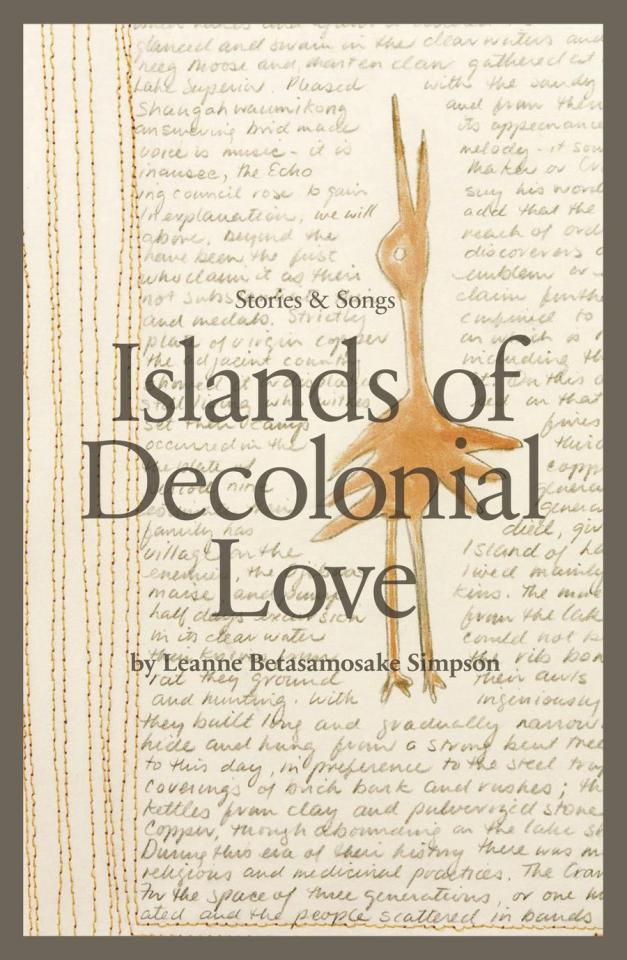


hello everyone, happy pi day/ides of march eve (pides of march? πdes of march?? what is happening)
...here's my first quarter of 2023 best books; you can find previous posts in this vein here and several years of recs on my substack.
also, i'm trying something new in 2023: for the first time, this year, i'm going to also include posts on academic and para-academic/pop-ac/whatever i want books, because otherwise i need to make Big Hard Unfair Choices and i don't want to do that to my babies.
so, today i give you my 9 best ("non-ac") books of the first quarter of 2023! tagging people below as usual, but everyone and no one is tagged. i'd love to see ANYONE'S top books from any time.
The Ways of the Monster by Jay Besemer
See You in the Morning by Mairead Case
blood snow by dg nanouk okpik
Lessons on Expulsion by Erika L. Sanchez
Fidelitoria: fixed or fluxed by Candice Wuehle
Dreadnought by Gretchen Felker Martin
Islands of Decolonial Love by Leanne Betasamosake Simpson
Kinderkrankenhaus by Jesi Bender
City of Saints and Madmen by Jeff Vandermeer
i tag: @capricornpropaganda @feypact @heavenlyyshecomes @materialisnt @pf2e @gwenderqueer @trans-axolotl @boykeats @transmess @vawoolf @bioethicists @sawasawako @xenofictionlesbian @grimesapologist @handweavers @closet-keys @secretcircuit @aldieb @alienpapacy @smokedsalmoniloveyou @llleighsmith @sadhoc @librarycard @oddmerit @discworldwitches @endure @noncompliance @artuhmes @powerfultulips @livinglavidalucid @ectorotica @myalgias @osmanthusoolong @punkkwix @aers @campgender @r-ob-yn @fatehbaz @antisisyphus @foragecore @homeplanets @hamath @thedyke and anyone else who wants to!!
114 notes
·
View notes
Note
books (assuming it’s okay to submit more than one):
Ángeles Vicente, Zezé (1909)
Rosa Guy, Ruby (1976)
Deborah Hautzig, Hey, Dollface (1978)
Samuel R. Delany, Tales of Nevèrÿon (1979)
Elizabeth A. Lynn, Watchtower (1979)
Nancy Garden, Annie on My Mind (1982)
Alice Walker, The Color Purple (1982)
John Preston, Franny, the Queen of Provincetown (1983)
Samuel R. Delany, Stars in My Pocket Like Grains of Sand (1984)
Timothy Findley, Not Wanted on the Voyage (1984)
Jeanette Winterson, Oranges Are Not the Only Fruit (1985)
Chrystos, Not Vanishing (1988)
Ian Iqbal Rashid, Black Markets, White Boyfriends, and Other Elisions (1991)
Crìsdean Whyte (Christopher Whyte), Uirsgeul / Myth (1991)
Carlos Sanrune, El gladiador de Chueca (1992)
Tom Lennon, When Love Comes to Town (1993)
Fernanda Farias de Albuquerque and Maurizio Jannelli, Princesa (1994)
Qiu Miaojin, Notes of a Crocodile (1994)
Shyam Selvadurai, Funny Boy (1994)
Gregory Maguire, Wicked (1995)
Christos Tsiolkas, Loaded (1995)
Nina Revoyr, The Necessary Hunger (1997)
Lola Van Guardia (Isabel Franc), Con pedigree (1997)
Tom Lennon, Crazy Love (1999)
Micheál Ó Conghaile, Sna Fir (1999)
Laurie J. Marks, Fire Logic (2002)
Nalo Hopkinson, The Salt Roads (2003)
Esdras Parra, Aún no (2004)
Barry McCrea, The First Verse (2005)
Manuel Tzoc, Gay(o) (2010)
Tama Wise, Street Dreams (2012)
Dane Figueroa Edidi, Yemaya’s Daughters (2013)
Jamie Berrout, Otros Valles (2014)
Niviaq Korneliussen, Homo sapienne (2014)
Leanne Betasamosake Simpson, This Accident of Being Lost (2016)
Nathan Niigan Noodin Adler, Wrist (2016)
Trifonia Meliba Obono, La bastarda (2016)
Sofia Samatar, The Winged Histories (2016)
Kai Cheng Thom, Fierce Femmes and Notorious Liars (2016)
jia qing wilson-yang, Small Beauty (2016)
Billy-Ray Belcourt, This Wound Is a World (2017)
Elliot Cooper, Rogue Wolf (2017)
Kevin Lambert, Querelle de Roberval (2018)
Joshua Whitehead, Jonny Appleseed (2018)
Masande Ntshanga, Triangulum (2019)
Leanne Betasamosake Simpson, Noopiming: The Cure for White Ladies (2020)
Tlotlo Tsamaase, The Silence of the Wilting Skin (2020)
Bendi Barrett, Empire of the Feast (2022)
Simon Jimenez, The Spear Cuts Through Water (2022)
Kōtuku Titihuia Nuttall, Tauhou (2022)
if you’d rather keep it to one book at a time: Samuel R. Delany, Stars in My Pocket Like Grains of Sand (1984).
Thank you so much for this fantastic list! They're all queued.
11 notes
·
View notes
Text
Hey so that reminds me. I have this book — Abolition. Feminism. Now. By Angela Y Davis, Gina Dent, Erica R Meiners, and Beth E Richie, copyright 2022 so very recent — that I have yet to crack open and could use some gentle encouragement to actually read.
And here you are, presumably on tumblr to be entertained, edified, and/or have your brain put through a blender for a few minutes. So let’s have a poll.



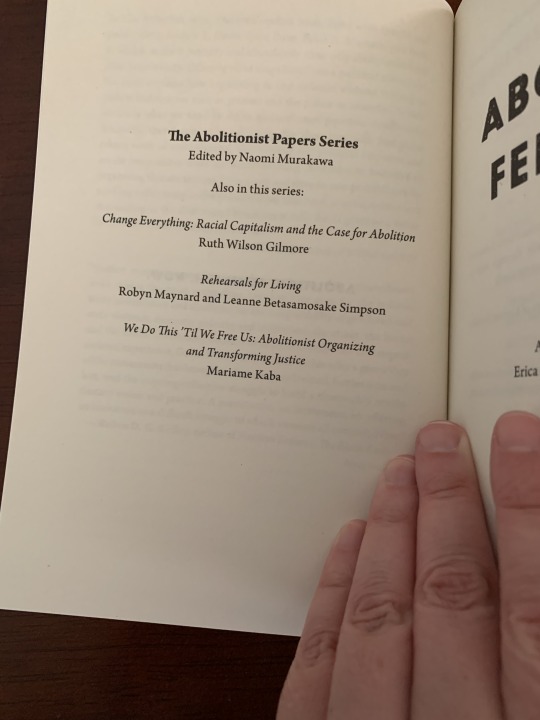

[Image descriptions:
Book cover (title and authors as above, abstract background in orange, reddish, and violet tones.)
Back cover. Purple background. Orange and white text reads: “An urgent, vital contribution to the indivisible projects of abolition and feminism, from leading scholar-activists Angela Y David, Gina Dent, Erica R Meiners, and Beth E Richie.
As a politic and a practice, abolition increasingly shapes our political moment — halting the construction of new jails and propelling movements to divest from policing. Yet erased from this landscape are not only the central histories of feminist — usually queer, anti capitalist, grassroots, and women of color-led — organizing that continue to cultivate abolition but also a recognition of the stark reality: abolition is our best response to endemic forms of state and interpersonal gender and sexual violence.
Amplifying the analysis and the theories of change generated from vibrant community-based organizing, Abolition. Feminism. Now. traces necessary historical genealogies, key internationalist leanings, and everyday practices to grow our collective and flourishing present and futures.
Table of contents. Includes: preface, introduction, part 1 abolition. Part 2 feminism. Part 3 now. Epilogue. Appendices: intimate partner violence and state violence power and control wheel. Incite!-critical resistance statement on gender violence and the prison industrial complex. Reformist reforms vs abolitionist steps to end imprisonment. Further resources. Notes. Image permissions. Index.
list of other books in the abolitionist papers series, edited by Naomi Murakawa, namely: Change Everything: Radical Capitalism and the Case for Abolition by Ruth Wilson Gilmore; Rehearsals for Living by Robyn Maynard and Leanne Betasamosake Simpson; and We Do This ‘Til We Free Us: Abolitionist Organizing and Transformative Justice by Mariame Kaba
Replicated image in the book of a pamphlet cover created by Jeff George and distributed by Survived and Punished (an organization that advocated for incarcerated survivors of abuse.) There is a large line drawing of a scale out of balance with a man in a business suit, large stacks of money, and sky scrapers on the heavy end and a small group of protesters holding a sign saying “free all survivors” on the other end. Large handwritten text says “no good prosecutors now or ever” and smaller stencil-like text says “how the Manhattan district attorney hoards money, perpetuated abuse of survivors, and gags their advocates.”
End image descriptions.]
#It would be so much less effort to just read say 10 or 15 pages of this thing and yet#It’s not a large book it’s under 250 pages#I literally had not cracked open the book before starting the post so I didn’t realize there aren’t ‘chapters’#So much as three main parts
13 notes
·
View notes